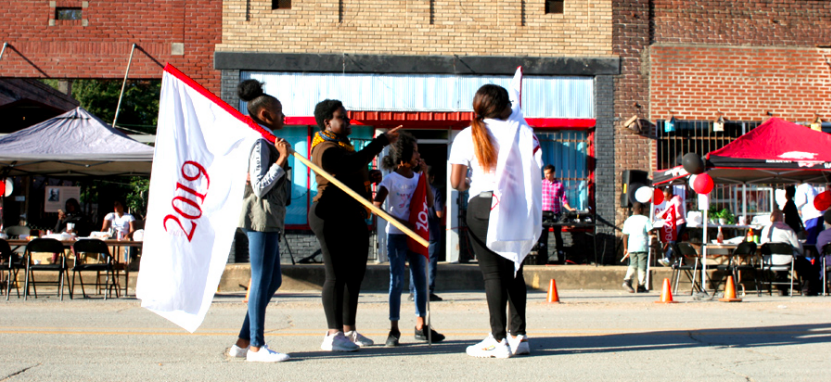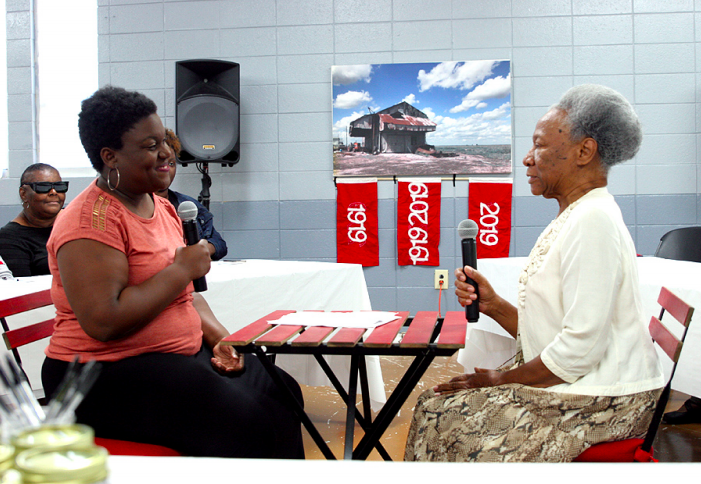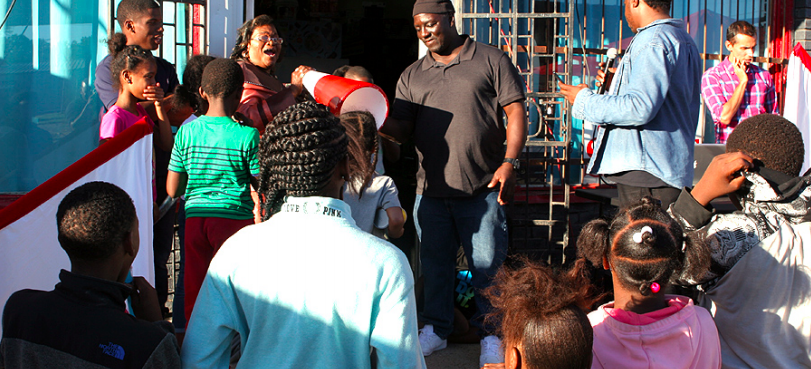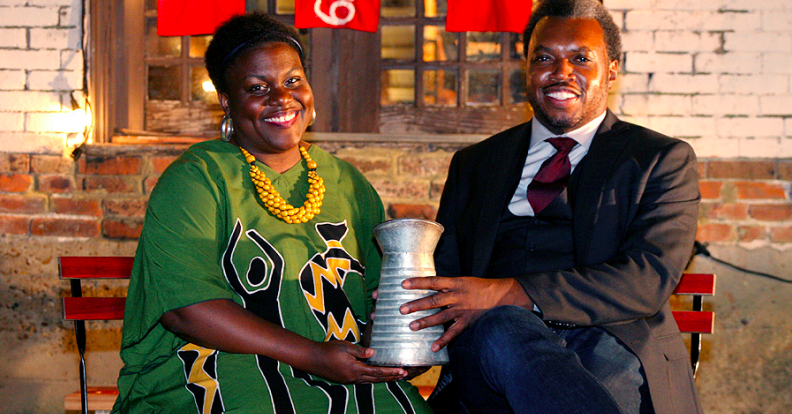Remember2019 is an effort to make space for the congregation of the Black communities of Phillips County, Arkansas. Our work is to support and facilitate local practices of self-determination, memory, and reflection that are directly related to the mass lynching of 1919, the lasting effects of racial terror, and the current and future health of these communities. Having recently developed and completed programming at the centennial of the 1919 Elaine Massacre in Phillips County, Arkansas, the Remember2019 team reflects on process, impact, values, aesthetics and vision around the work of the project over the last 4 years while also considering the futures of the work over the next four years.
I'm going to share a bit about our process.
I joined the Collective in 2016 after Mauricio put out a call, during a class that we were both in in graduate school, to join him on a project that could perhaps be a 10-year-long project. I was drawn in by the way he was thinking about showing up in community, in Phillips County, to listen. And in particular, listening for welcome, listening for invitation to continue to be in conversation with folks. So later that year Mauricio, Alessandra and I went on this trip to Phillips County, and the primary work of that first trip was really just listening in community with folks, listening to people talk about what they have heard about the Elaine Massacre, listening to how people feel about the political landscape in Phillips County.

We were introduced to perhaps 20 different community members over the course of two weeks. From that handful of people, we began to kind of build relationships, some of which grew into larger partnerships. Our partnership with the Elaine Legacy Center came out of our first round of introductions that first summer. The next year we returned. We began to think about how to return and be in conversation with, showing up for asks and requests for service in community. At that time, we were also growing. And Carlos Sirah joined the project.
So that next summer in 2017, we built programming in response and in conversation with our budding partners. Mauricio did the work of supporting a youth led mural at the Boys, Girls, and Adults Community Development Center. We ran a camp that I worked to develop called Visiting Elaine Heroes, and that camp was about lifting local heroes in Elaine and just thinking about the arts and having a space for young people to come and look forward to playing each day. We also produced a staged-reading of Scapegoat by Christina Ham. That was hosted and produced by the Delta Cultural Center and directed by Ashley Teague, dramaturged by Mauricio, with a band of performers from around Arkansas performing the work. Sharing Scapegoat was a moment to kind of dream with community about what a performance about the massacre could look like. And from there, we really just sat with the responses we got from each of those encounters, each of those programs.

I think at the end of that summer, Mauricio and Carlos started jamming about the building of Black ‘n da Blues, or what would become Black ‘n d Blues. We also were thinking about the importance of story, of lifting local story sharing practices, looking at the song traditions of the Delta as a deep story sharing practice, looking at gossip and lore as technologies toward story. Those conversations would later become the Story Sharing Institute that I co-developed with Carlos. The next year, we ran that Institute, which supported the work of 10 different community members thinking about how they might individually collect story. Then later that fall, Mauricio and Carlos developed Black ‘n da Blues in conversation with a body of local musicians and artists.
The following year, 2019, this past summer and fall, we were thinking about how to take the Story Sharing Institute and amplify the work and the agency of local cultural workers in conversation with that. We developed callin’ down the road, which is a residency that gathered five different community members to dream into projects ranging in content. James White's project brought together young people and elders in intergenerational story transmission. Faye Duncan Daniel's work was in conversation with white folks and also thinking about gathering story and supporting spaces for gathering for Black women in Phillips County to talk about colorism and to talk about what it is to support each other. A variety of brilliant projects also from Phillip Stackhouse and Anita Marie Harrison Mayo and Lenora Marshall and Ethel Williams were supported through that residency.
We were also thinking about these cultural workers as a cohort and how they could continue to be in conversation with each other over time. Each week we gathered together and had these really tremendous meals and conversations about where their projects were at and how they might support each other in them. Concurrently as those projects were happening, we were also in conversation with a few different practitioners from outside of the region. We developed a Diaspora residency for artists who no longer live in Phillips County but either their families are from Phillips County or in their lifetime they migrated out of Phillips County for whatever reason. This was an exploration of Diasporas away from the County in relationship to the great migration, ways in which people have moved out of the region.
We engaged with choreographer Reggie Wilson, whose family is from Marvell and multidisciplinary artist, Angela Davis Johnson, whose family is from Lambrook and storyteller, Wanda Whiteside, whose family is from Elaine. And we were able to be in conversation with them about their practice. Over the course of a month and a half they all came to Phillips County at some point in time. In addition to the two residencies, we decided to build a story bank that would collect 10-minute stories from folks from around the county in barber shops and churches, bars, schools, restaurants. In that work we collected over 75 different stories from Black folks that is an archive of that moment in time. And from those stories we built a 100-minute long monument mixtape, comprised of the stories, small snippets of these stories, that we then shared at 3 listening parties we developed in Marvell, Elaine and Helena West-Helena.

I would say that really all of those projects, all of those programs, the constellation of all of them is really us being responsive, immediately responsive to tactics that feel they're of interest in community, that feel they could work, to throwing things at the wall, to really offering things to people and being like, "Hey, what do you think about this idea?" Getting their feedback and listening deeply. I would say that there are ways in which our process really compounded upon itself. From listening deeply in community, to showing up and being of service where we were requested and then to offering some ideas about what might be culturally or artistically interesting. Historically interesting. Seeing how the communities vibe with it and then moving and building programming from there.
Ashley offered a few questions that I want to get to as well. She asks "When and how do we evolve process as we go? What is the process of changing approach in the moment, pivoting toward new tactics?" I would say that our collective is really good at being responsive in the moment to how we are as artists are individually vibing, how community is or isn't vibing with a work. I think that some of that stems from a constant reminder to not hold our vision about what would be programmatically good as higher than the interests of the community.
And we continue to do work, as individuals, around identifying our own cultural specificity, our own locations culturally within Phillips County and in relationship to Phillips County. Carlos’ proximity as a Black person from Mississippi, from the Delta, is deeply different from my proximity or distance as a Black person from Georgia, from the Bay Area. And that kind of expands and ripples across our group. And I think that we listen to that. We listened to the ways that we know and that we don't know. And I think that that helps us lean into process as long and durational.

Okay. Let's get to another question, “What is it like to work with folks who have different processes from me?” Yeah, I think that we are really careful in that way, not to step on each other's toes. We're super mindful to know like, hey, Mauricio doesn't work that way. Or Ashley doesn't work that way. Or Arielle needs A, B, C, D or E. As a group, I think that we do a tremendous amount of work to be mindful of each other in those ways.
And I think in addition, and by extension, we do a tremendous amount of work to be receptive to our other collaborators in those ways. I think it just stems from this core practice of deep listening. I wish I had a more nuanced way to approach that. We get into our struggles with each other. There are moments when there might be one collaborator in Phillips County who vibes more with Carlos' process or way of working than they do with Ashley's process. And we just kind of move with that. We don't take it personal, we just do the work with that, and try to be clear about consensus as a value amongst us.
Then finally, “How do we come together when we have different processes from folks who live in Phillips County?” Correct. I think I just answered this question
I think that what's so great about the difference amongst our collective is that at any given moment, one or two or all five of us is going to clock that, that there's a discrepancy in the way that we understand working, and the way that folks here understand a thing culturally or in our process. And I think whenever someone stands up and says, hey, I think that way of working isn't going to serve community, we all listen and are just in response. Or if we have a community member come to us and say, oh, I don't think that the way such and such has been treated or the standard they've been held to is the same standard that I've been held to, we're just doing what we can at all times to be nimble and responsive.
And I feel like that nimbleness is a core value of ours that we can return to and hold ourselves accountable to, knowing that that's the only way that we can work and be proximate to a just process. That time, that holding fixed to how things should work on a time schedule, while it might serve efficiency in our process, it may not serve community. And so how can we be responsive to that? So, yea, those are my thoughts.
